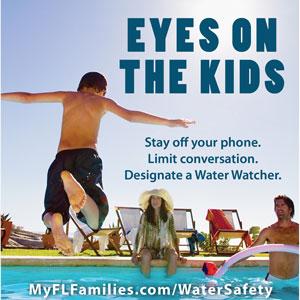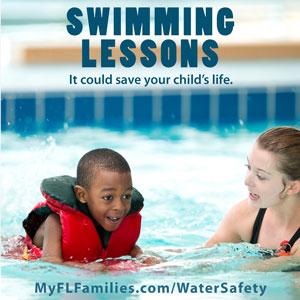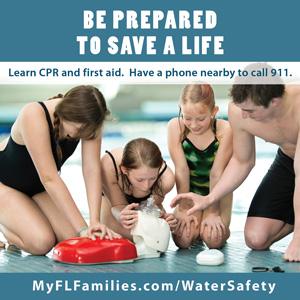There are many layers of protection that can prevent drowning deaths.
The state loses more children under the age of five to drowning than any other state in the nation. As we play in the summer sun, it is important to emphasize supervision and swim safety while spending time with friends and family around the pool.

Eyes on the Kids
SUPERVISION: Someone should always be actively watching children when they are in the pool. This means don’t play around on your phone or get involved in a big conversation while watching the kids. Drowning can happen in just a few minutes. Designate a “Water Watcher” to keep an eye on swimmers.
BARRIERS: A child should never be able to enter the pool area unaccompanied by an adult. Barriers physically block a child from the pool. Barriers include child-proof locks on all doors, a pool fence with self-latching and self-closing gates, as well as door and pool alarms. Pool covers may also be used but make sure it is a professional cover fitted for your pool. A simple canvas covering can be a drowning hazard and entrap a child in the water. Florida law requires barriers for home pools.

Swimming Lessons
The American Academy of Pediatrics recommends that children ages 4 and older learn to swim in order to help prevent drowning. It also encourages caregivers of children ages 1-3 to consider swim instruction for their child, as studies have shown it reduces drowning incidents. Caregivers should learn to swim as well.
To find swimming lessons in your area, contact your local YMCA, city facilities, or swim school or call 2-1-1. Many of these programs have scholarships available.

Emergency Preparedness
The moment a child stops breathing there is a small, precious window of time in which resuscitation may occur, but only if someone knows what to do. Even if you’re not a parent, it’s important to learn CPR. The techniques are easy to learn and can mean the difference between life and death. In an emergency, it is critical to have a phone nearby and immediately call 911.
To learn more about CPR or find a CPR certification course, call 2-1-1 or visit the American Red Cross or American Heart Association.



